| | | | | | | | | | | Axios China | | By Bethany Allen-Ebrahimian · Apr 19, 2022 | | Welcome back to Axios China. Today we're looking at China's lockdown economy, U.S.-China competition in the Solomon Islands, congressional support for Taiwan, and lots more. - Tell your colleagues and friends to sign up to receive weekly updates about China.
- Got a tip? Send it to bethany@axios.com, or just hit reply.
Today's newsletter is 1,751 words, a 6½-minute read. | | | | | | 1 big thing: China's lockdowns raise economic concerns | 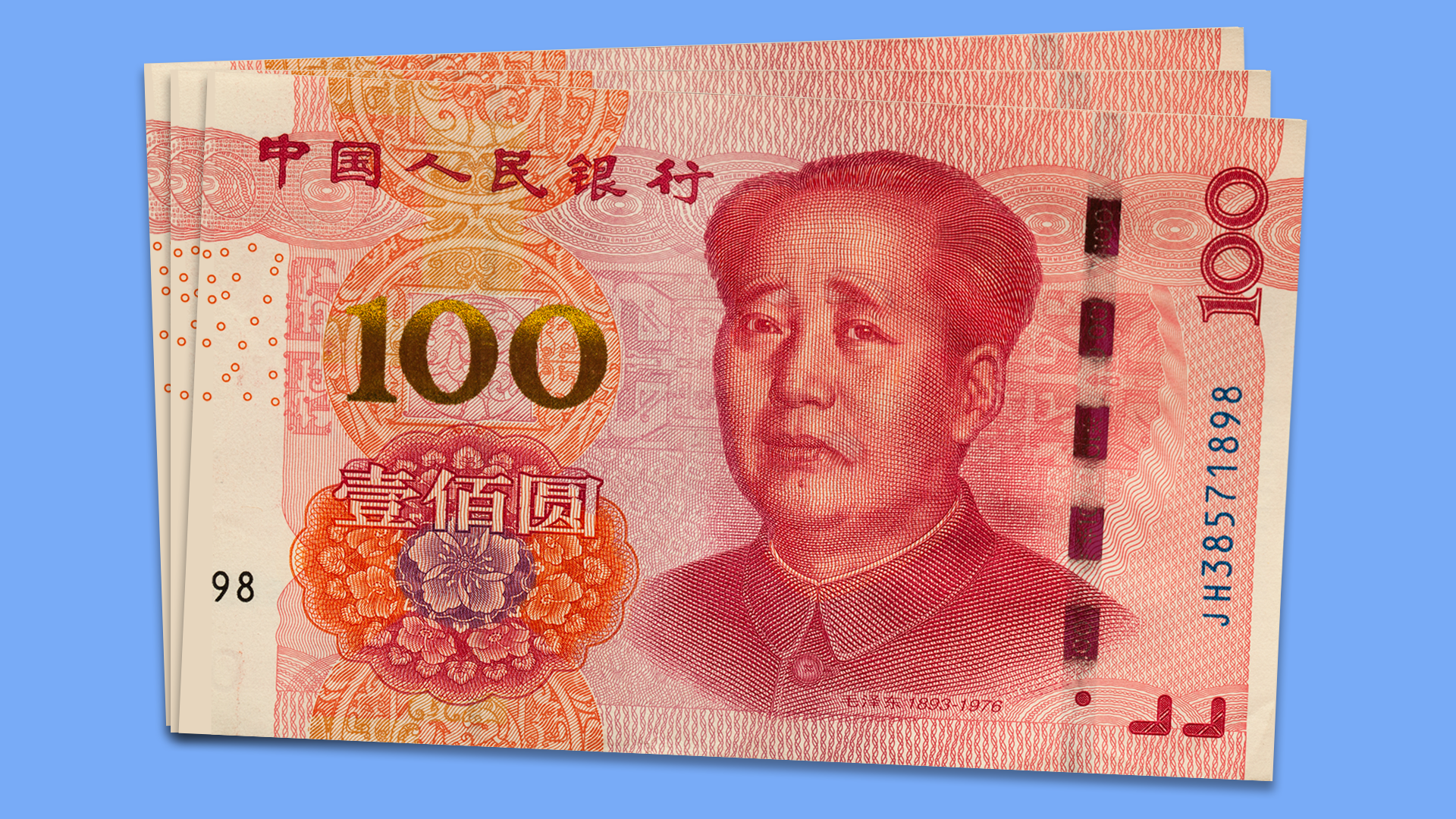 | | | Illustration: Sarah Grillo/Axios | | | | COVID lockdowns and travel restrictions across China are exerting downward pressure on the country's economy, Axios' Matt Phillips and I write. Why it matters: China is the largest single driver of global economic growth. Its economic woes will quickly become the world's problem. - China is an export giant and a crucial cog in global supply chains, so Chinese factory shutdowns and logistical disruptions will amplify the already-problematic global price pressures.
Driving the news: Chinese economic data out Monday confirmed that the world's second-largest economy has sputtered as the government combats the worst outbreak of COVID so far on the mainland. - Retail sales tumbled 2% during March. Compared to March 2021, retail sales were down 3.5%, the worst annual drop since 2020.
- The country's unemployment rate rose to 5.8%, above the government's target of 5.5% and the worst since May 2020, when the country was first emerging from lockdowns after the initial virus outbreak in Wuhan.
- Industrial production slowed sharply in March, as did investment in the domestic real estate sector, which has been a key driver of the country's growth.
The big picture: China's economy grew 4.8% year-on-year, according to first-quarter economic data released yesterday. - But most of that growth occurred in January and February. Growth slowed in March, as the impact of China's strict lockdowns was felt.
- Last week, Chinese Premier Li Keqiang called for a "sense of urgency" and said that "downward economic pressure has further mounted."
- "The pandemic has to be the biggest source of risk for China's growth this year," Zhennan Li, chief China economist at AllianceBernstein, told the Wall Street Journal.
State of play: China is in the midst of its worst known outbreak of the coronavirus since the pandemic began in early 2020. The surge in cases, which have more than doubled over the last month, has prompted a range of lockdowns. - JPMorgan analysts currently estimate that "areas with full or partial lockdowns accounted for about 25% of GDP," according to a recent research note.
What we're watching: The International Monetary Fund's update on the outlook for the global economy — due to be released in a couple of hours — could spell out how much China's economy will drag on the global growth. |     | | | | | | 2. Solomon Islands becomes unlikely epicenter of U.S.-China competition | 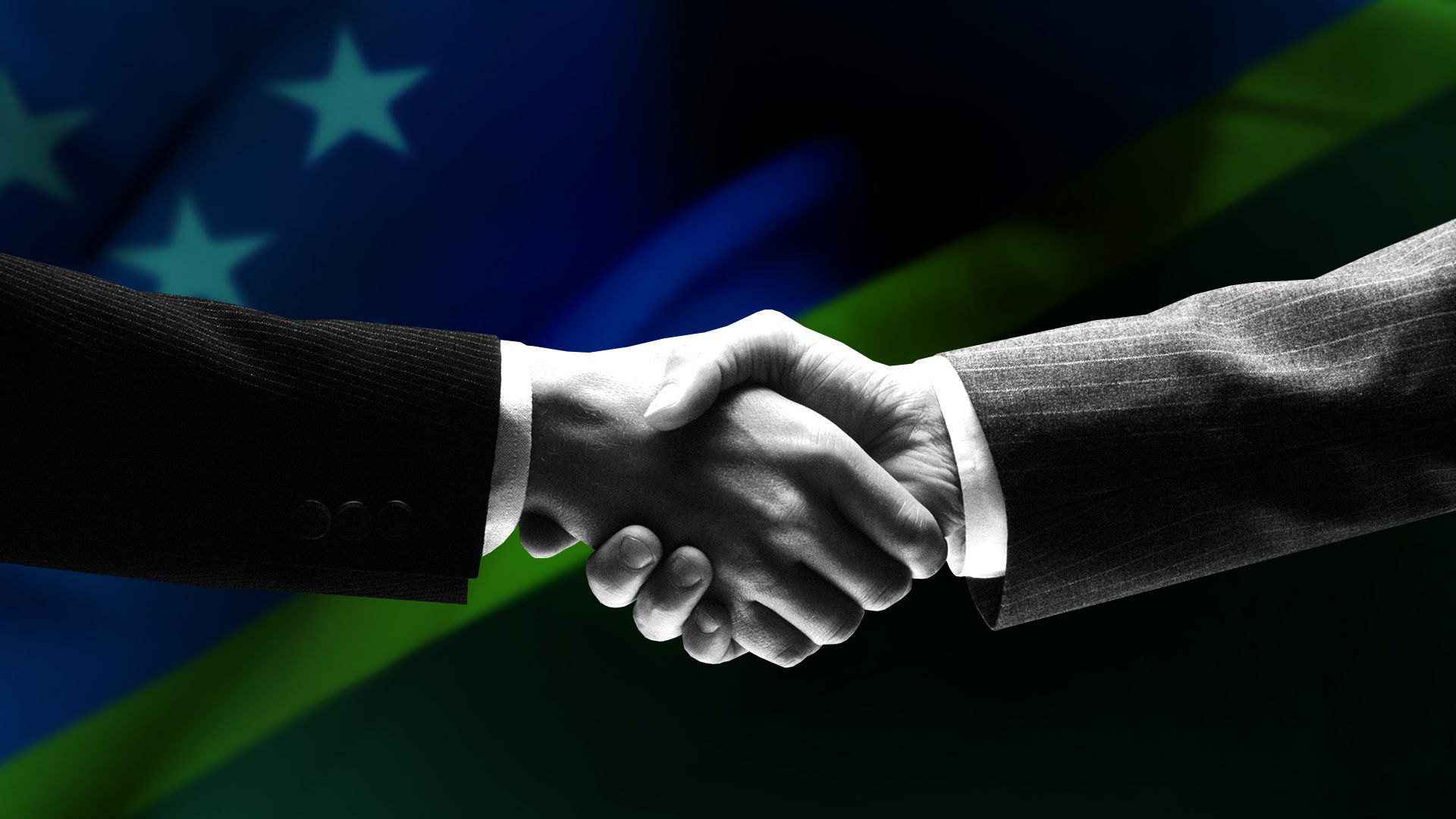 | | | Illustration: Annelise Capossela/Axios | | | | A U.S. delegation led by the top White House and State Department officials for Asia is heading this week to the Solomon Islands, a South Pacific archipelago with fewer than 700,000 inhabitants that has unexpectedly become ground zero for U.S.-China competition, Axios' Dave Lawler, Zach Basu and I write. Why it matters: A planned security agreement negotiated with Beijing, which could allow China's navy to dock warships on the islands, sent the U.S. and its allies in Australia and New Zealand into diplomatic hyperdrive. - According to a draft agreement that began circulating online last month, the Solomon Islands could request Chinese security forces to restore "social order." Once on the islands, the forces would also have the authority to "protect the safety of Chinese personnel and major projects."
The latest: With the U.S. officials already en route to the South Pacific, Chinese Foreign Ministry spokesperson Wang Wenbin said Tuesday that the deal had already been signed, per Reuters. - That has not been publicly confirmed by the Solomon Islands, but Prime Minister Manasseh Sogavare recently told parliament his government was preparing to sign it.
Australian Prime Minister Scott Morrison dispatched a senior diplomat to the islands and described the pending deal as a "great concern," with New Zealand echoing that sentiment. - Between the lines: The deal could see Chinese naval vessels docking about 1,250 miles to the northeast of Australia and signal that Canberra's traditional influence in the South Pacific is waning.
Sogavare rejected the "very insulting" suggestions that his country was "unfit to manage our sovereign affairs." - U.S. officials, led by White House Indo-Pacific coordinator Kurt Campbell and assistant secretary of state for East Asian and Pacific Affairs Daniel Kritenbrink, will make the case that the U.S., not China, "can provide security, prosperity and peace for the region," an administration official told Axios on Monday.
- Accompanied by USAID, they'll "be talking about a range of ways to offer assistance in the region," the administration official said.
Flashback: Matt Pottinger, the top Asia expert on former President Trump's National Security Council, visited the Solomon Islands in March 2019 amid concerns the small nation — one of Taiwan's few remaining diplomatic partners at the time — might switch allegiance to China. - Despite a diplomatic push from Washington, the government cut ties with Taiwan in September 2019.
- The U.S. must be "very, very active" in the Pacific islands region, Pottinger told Axios on Monday. "U.S. and Australian policy toward the Pacific can't fly on autopilot when the competition is as far along as it is, when China is so focused on military basing and influence and intelligence-gathering in that region."
Read the full story. |     | | | | | | 3. Catch up quick | | 1. Shanghai officials reported the city's first official COVID deaths from the latest outbreak. Go deeper. 2. Asian American advocates fear anti-China rhetoric will be weaponized in midterms. Go deeper. 3. Chinese President Xi Jinping spoke on the phone with Saudi Crown Prince Mohammed bin Salman, Xinhua reports. 4. Taiwan's Ministry of Defense issued the country's first-ever civil defense handbook, Reuters reports. 5. Frances Hui said she is the first Hong Kong activist to receive asylum in the U.S., Hong Kong Free Press reports. - Read Hui's October 2021 interview with Axios, when she talked about her fears of extradition to China if she visits countries friendly to Beijing.
|     | | | | | | A message from Axios | | Market news worthy of your time | | | 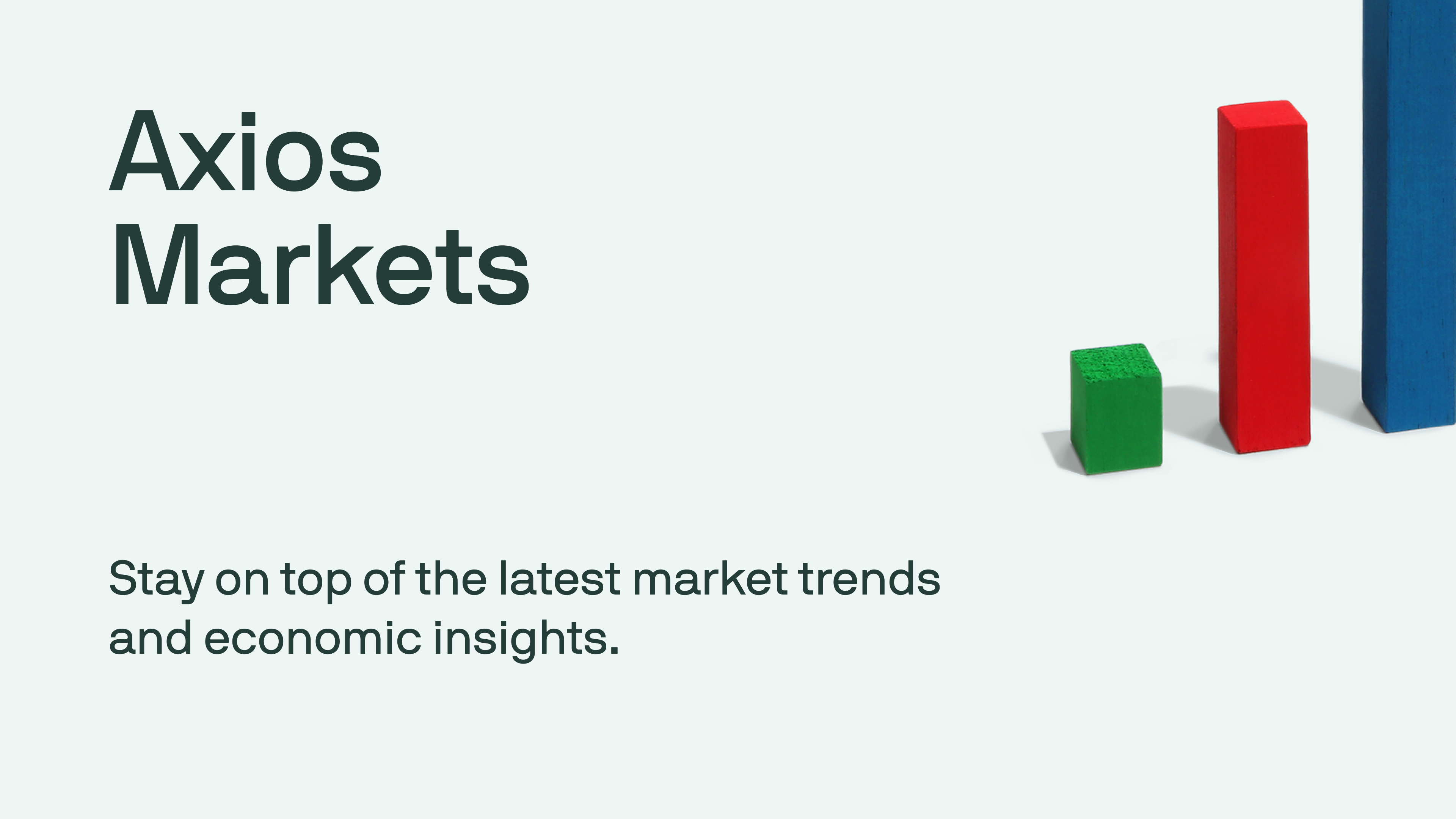 | | | | Get a daily look at the news and trends dominating the worlds of global business and finance. Why it matters: We highlight the stories that matter and share crucial economic insights. Stay informed in just a few short minutes. Subscribe for free | | | | | | 4. Congress sounds alarm bells on Taiwan | 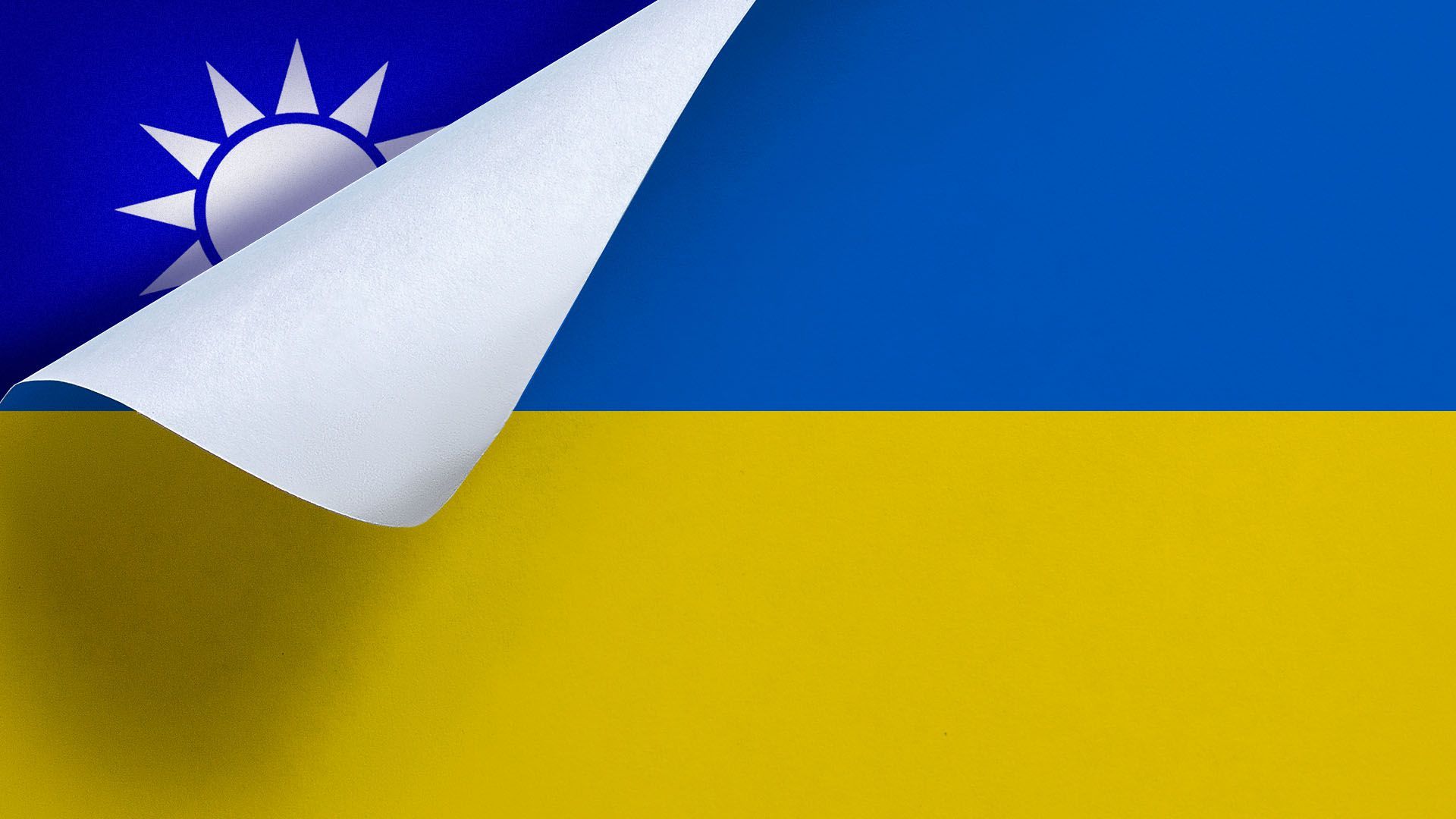 | | | Illustration: Sarah Grillo/Axios | | | | Russia's invasion of Ukraine has prompted congressional concern about the security of Taiwan and the greater Indo-Pacific region, Axios' Sophia Cai writes. Why it matters: While war rages in eastern Europe, the fear is that an island nation half a world away will become another site of a violent struggle for democracy. What they're saying: "The U.S. should have given Ukraine a sizable supply of weapons — both through sales and security assistance — before Russia invaded," Sen. Jim Risch (R-Idaho ), the top Republican on the Senate Foreign Affairs Committee, told Axios in a statement. - "We can clearly see Taiwan has similar needs and faces similar threats, and there is still time to help them prepare."
The big picture: The Biden administration last week approved the sale of up to $95 million worth of training and equipment to support Taiwan's Patriot missile defense system. - The latest omnibus spending package includes a provision banning the use of any maps by the State Department and its foreign operations that "inaccurately" depict Taiwan as part of China.
- The China competition bills that are expected to be conferenced when Congress returns from recess also include provisions to enhance U.S. military, cultural and diplomatic ties with Taiwan.
Sen. Richard Shelby (R-Ala.), the top Republican negotiator on the Appropriations Committee, said the U.S. should "absolutely" be spending more to help Taiwan develop its own defense capabilities. - Last week, Sen. Josh Hawley (R-M0.) introduced legislation to fast-track arms sales to Taiwan by expediting congressional approval and eliminating administrative roadblocks.
Go deeper: Taiwan sees lessons in Ukraine |     | | | | | | 5. What I'm reading | | Global island: Sustaining Taiwan's international participation amid mounting pressure from China (Center for a New American Security) - This report lays out the three main ways Beijing is trying to isolate Taiwan from the international community: poaching Taiwan's remaining diplomatic partners, "bullying" countries to reduce their unofficial ties with Taiwan, and pushing Taiwan out of international organizations.
- To counter this, the authors write, "Washington and Taipei should roughly prioritize unofficial relations with major and like-minded countries first, expanding multilateral participation second, and protecting its group of official diplomatic relations last."
Double dribble: Brooklyn Nets owner Joe Tsai is the face of NBA's uneasy China relationship (ESPN) - "In the United States, Tsai donates hundreds of millions of dollars to combat racism and discrimination. In China, Alibaba, under Tsai's leadership, partners with companies blacklisted by the U.S. government for supporting a 'campaign of repression, mass arbitrary detention and high-tech surveillance' through state-of-the-art racial profiling."
- "Joe Tsai could resign," China analyst Matt Schrader told ESPN. "He doesn't have to do this. He's a Canadian citizen. He has the freedom to make that choice so long as Alibaba continues to facilitate and participate in a genocide."
Return to Maoism: China's "zero Covid" mess proves autocracy hurts everyone (New York Times) - "Long before the 'zero Covid' policy, China had a 'zero sparrow' policy," Li Yuan writes, a reference to the small birds. "Just as Mao and his lieutenants ignored the opposition to their anti-sparrow policy from scientists and technocrats, Beijing has ignored experts' advice that China abandon its costly strategy and learn to coexist with the coronavirus, especially a milder, if more infectious, variant."
- "Mr. Xi is keen to stick to the strategy because he is seeking a third term at an important Communist Party congress later this year. He wants to use China's success in containing the virus to prove that its top-down governance model is superior to that of liberal democracies."
|     | | | | | | 6. 1 Taiwan thing: Pocketbooks for democracy | 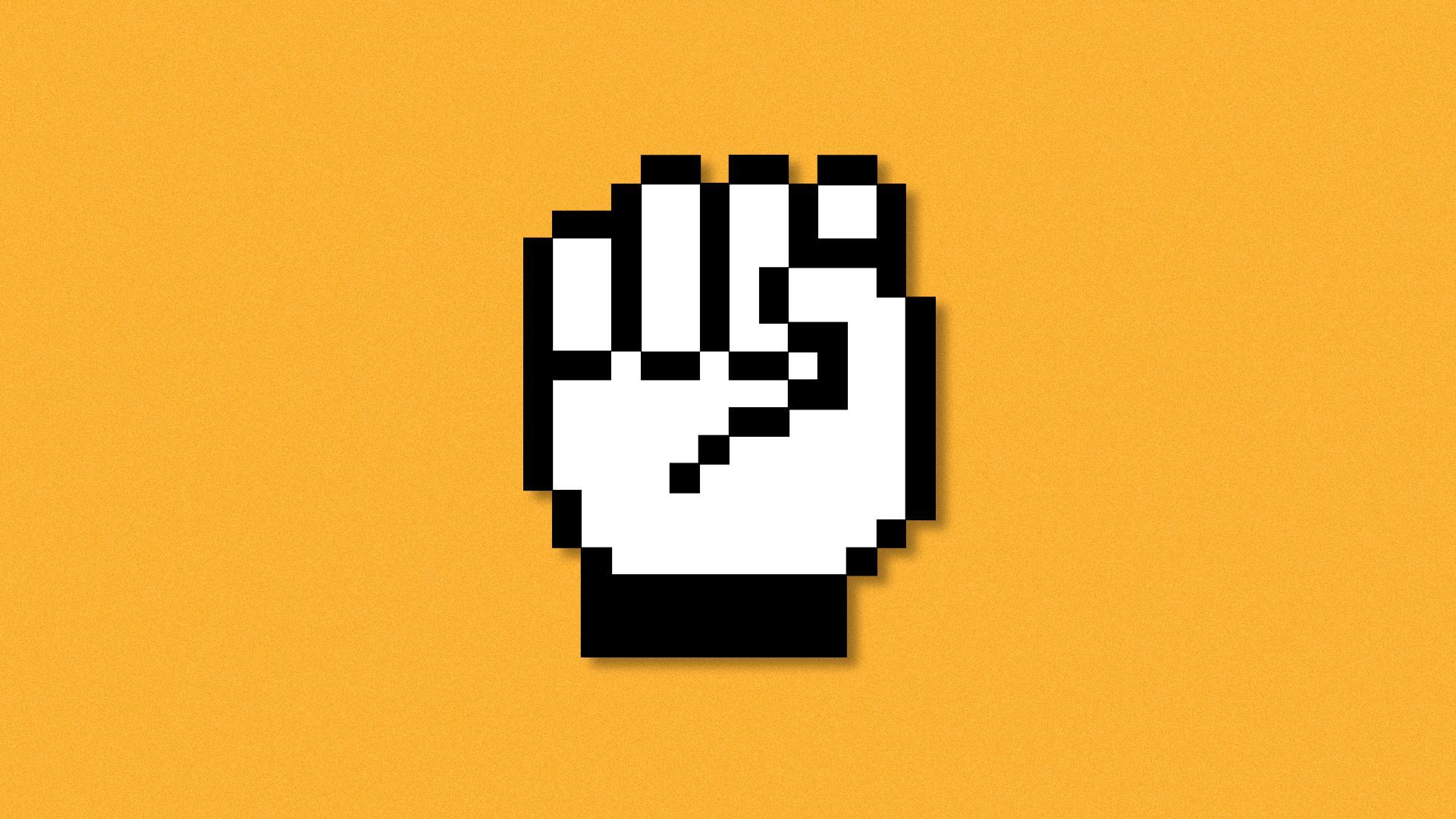 | | | Illustration: Annelise Capossela/Axios | | | | A grassroots organization in Taiwan is helping democracy-conscious consumers put their money where their values lie. The big picture: Boycotts by Chinese nationalists target companies viewed as having crossed Chinese Communist Party red lines — including supporting Taiwan's effort to be recognized as a sovereign state. One group in Taiwan hopes to galvanize consumers in democratic countries to push back. Details: Snowball, a nonprofit organization co-founded in February 2021 by Taiwan-based Americans Colin Hodge and Nadav Mills and run by volunteers from Taiwan and elsewhere, compiles ratings of milk tea shops and retail chains in Asia based on their positions on Hong Kong, Taiwan and other issues related to political values and human rights. - Snowball's website, which is in both Chinese and English, now includes guides for 22 shops and top brands.
What they're saying: "As consumers and businesses, we can continue to increase our influence on companies, industries and governments by steering our financial support to those who align with our values of improving human rights and freedoms," Hodge said. Context: Russia's invasion of Ukraine galvanized consumers around the world to avoid organizations with ties to Moscow and instead shop at stores that openly support Ukraine. - "Much of the democratic world was operating under the illusion that deep financial ties with authoritarian governments would serve as a sufficient deterrent for flagrant aggression, and that those governments would liberalize over time. That illusion now seems shattered," Hodge told Axios.
- Hodge hopes that consumers will make this attitude permanent and apply it to China as well.
|     | | | | | | A message from Axios | | Market news worthy of your time | | |  | | | | Get a daily look at the news and trends dominating the worlds of global business and finance. Why it matters: We highlight the stories that matter and share crucial economic insights. Stay informed in just a few short minutes. Subscribe for free | | | | Thank you to Alison Snyder for edits, Sheryl Miller for copy edits, and Annelise Capossela and Sarah Grillo for visuals. |  | It's called Smart Brevity®. Over 200 orgs use it — in a tool called Axios HQ — to drive productivity with clearer workplace communications. | | | | | | Axios thanks our partners for supporting our newsletters. If you're interested in advertising, learn more here.
Sponsorship has no influence on editorial content. Axios, 3100 Clarendon Blvd, Suite 1300, Arlington VA 22201 | | | You received this email because you signed up for newsletters from Axios.
Change your preferences or unsubscribe here. | | | Was this email forwarded to you?
Sign up now to get Axios in your inbox. | | | | Follow Axios on social media:    | | | | | |








No comments:
Post a Comment